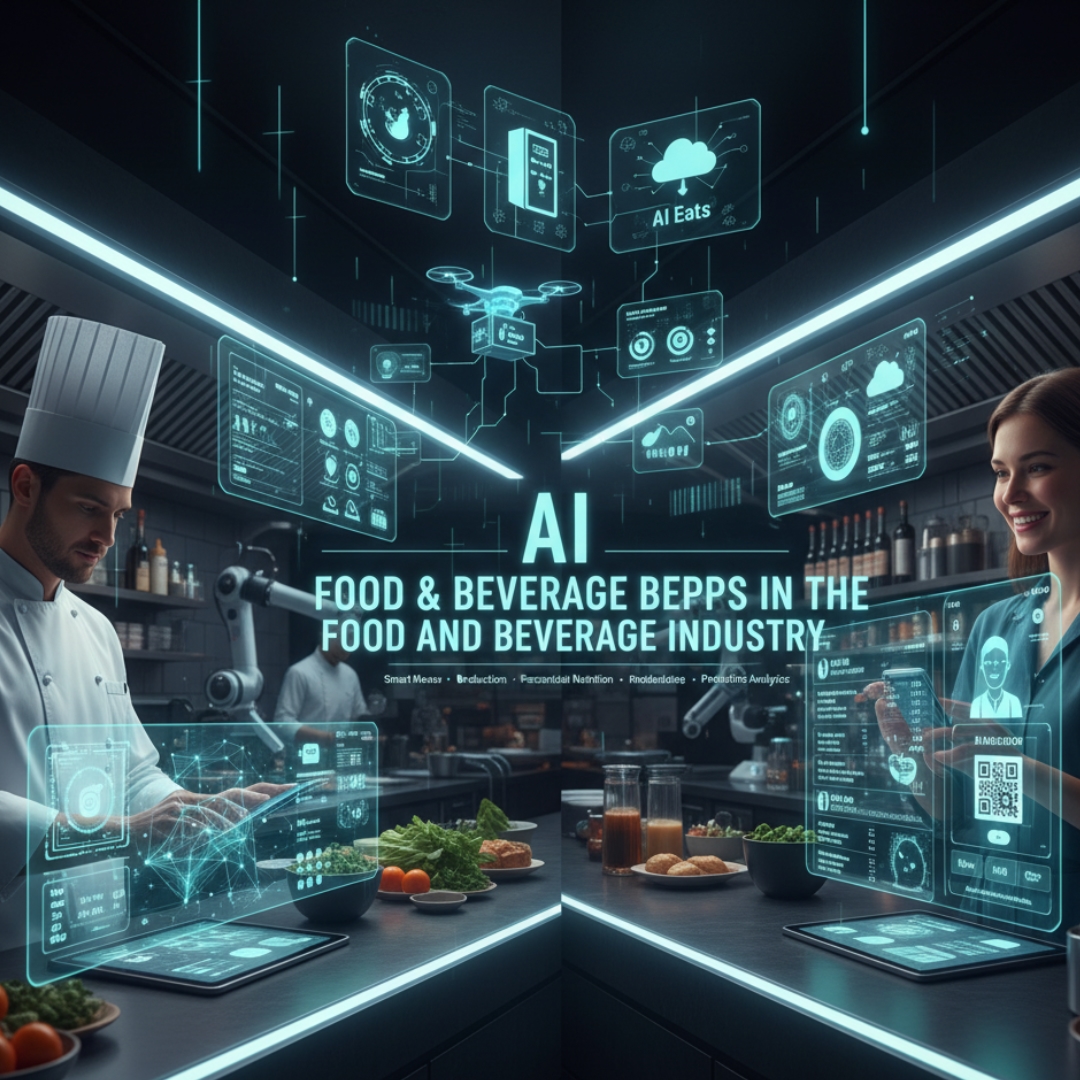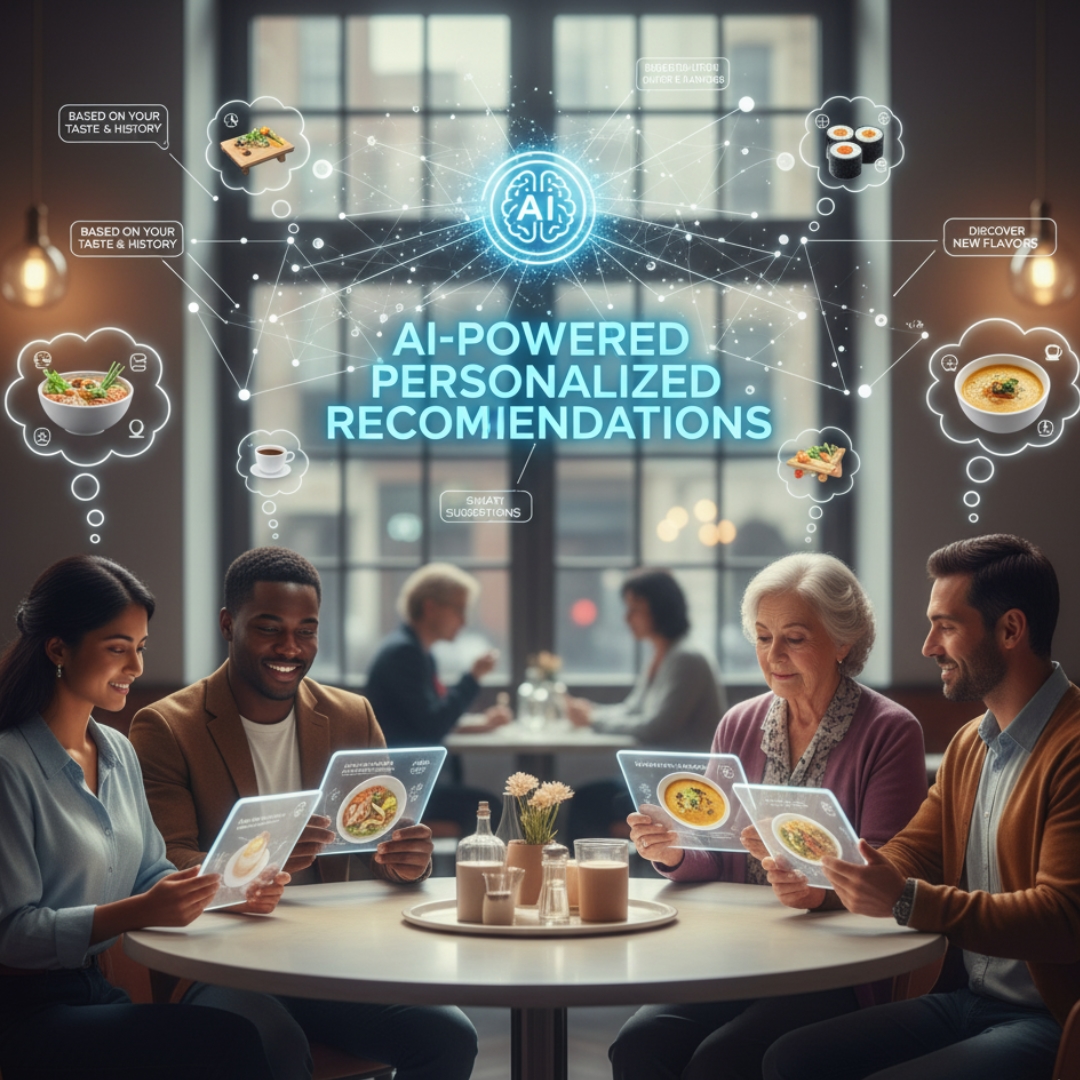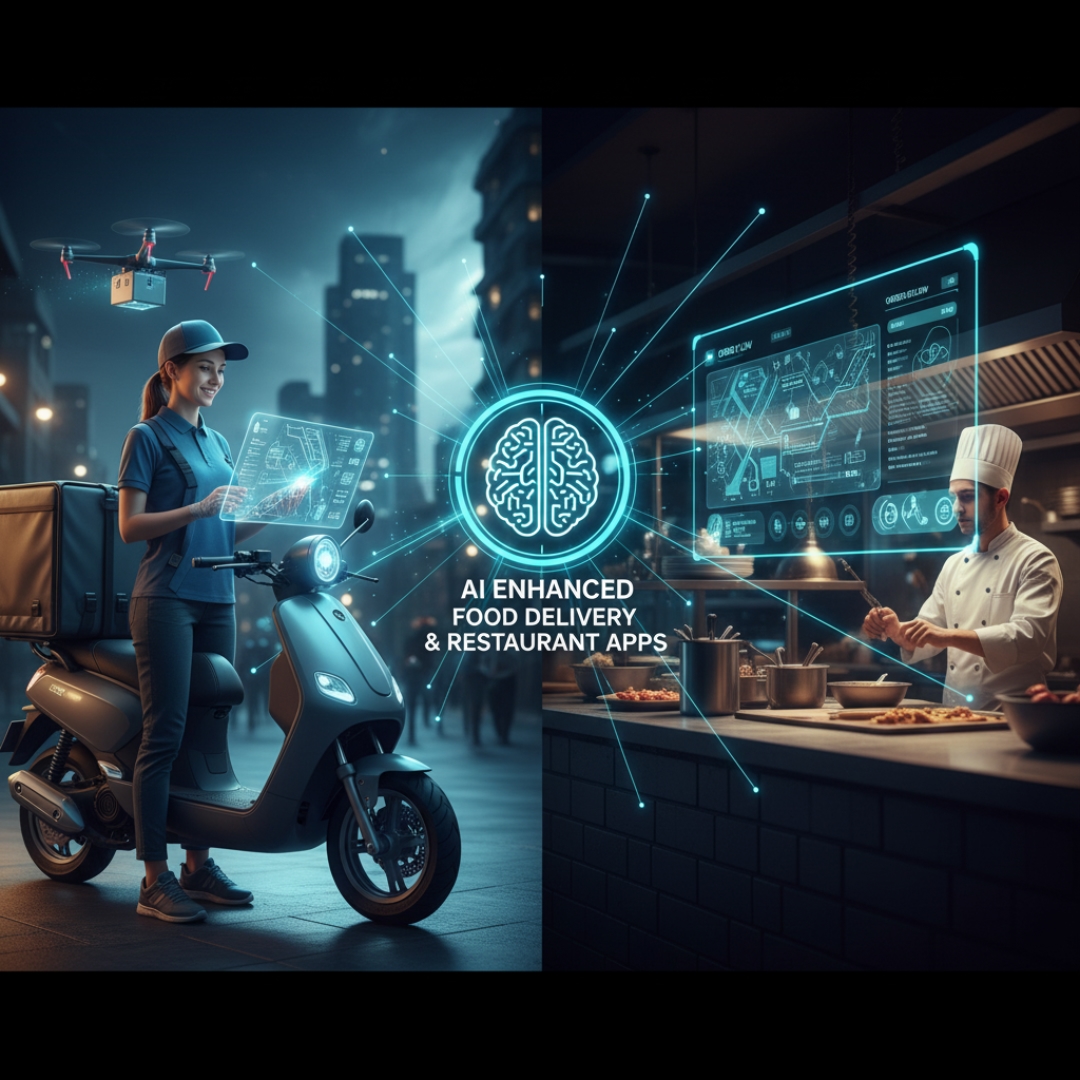
Artificial Intelligence (AI) is no longer a futuristic concept — it has become a cornerstone of innovation in the food and beverage industry. From restaurants to online food delivery platforms, businesses are leveraging AI-powered apps to enhance customer experiences, streamline operations, and drive growth.
The global food and beverage market is becoming increasingly competitive, and businesses are turning to technology to differentiate themselves. AI integration in food apps helps restaurants and delivery services provide personalized recommendations, smart inventory management, predictive analytics, and real-time customer engagement, making operations more efficient and customer-centric.
In 2025, the role of AI in food and beverage apps is set to grow exponentially, with innovations reshaping how customers order, receive, and experience food. This article explores how AI is transforming apps in this industry, highlighting key applications, benefits, real-world examples, and future trends.
The Growing Role of AI in Food and Beverage App Development
Evolution of the Food Industry with Technology
The food and beverage sector has witnessed remarkable technological advancements over the past decade. Initially, apps focused on simple online ordering and menu browsing. However, with AI, modern food apps have evolved into intelligent platforms capable of understanding customer behavior, predicting demand, and optimizing operations.
AI-powered food delivery app development can learn from past orders, analyze user preferences, and make personalized recommendations, transforming how restaurants and delivery services engage with their audience. This evolution has not only improved customer satisfaction but also increased revenue by enhancing operational efficiency and marketing effectiveness.
Importance of AI Integration in Modern Food Apps
The integration of AI in food and beverage apps is no longer optional — it’s essential for businesses seeking a competitive advantage. AI enables apps to:
Predict customer needs and preferences
Automate repetitive tasks such as order management
Optimize supply chains and inventory
Provide data-driven insights for decision-making
With AI, food apps move beyond being transactional platforms to becoming intelligent systems that enhance both business performance and customer experiences.
Key Applications of AI in the Food and Beverage Industry
AI is transforming every aspect of food and beverage apps. Here are the most impactful applications:
1. AI-Powered Personalized Recommendations

One of the most visible impacts of AI is in personalized user experiences. By analyzing past orders, dietary preferences, and browsing behavior, AI algorithms can recommend dishes that match individual tastes.
For instance:
A customer who frequently orders vegan food will see tailored suggestions for new vegan dishes.
AI can recommend complementary items (e.g., dessert or beverage) based on prior orders.
Personalization increases customer engagement, retention, and average order value, making it a critical feature for food and beverage apps.
2. Smart Inventory and Supply Chain Management
Restaurants and delivery services face challenges in managing inventory efficiently. AI-powered apps can predict stock requirements, reducing food waste and ensuring that popular items are always available.
Key AI functionalities include:
Real-time tracking of stock levels
Predictive alerts for low inventory
Automatic supplier reordering
By leveraging AI for inventory management, businesses save costs, reduce waste, and maintain operational efficiency.
3. Predictive Analytics for Food Demand Forecasting
AI-powered predictive analytics allows businesses to forecast demand with high accuracy. Using historical sales data, seasonal trends, and customer behavior patterns, AI can:
Anticipate peak ordering hours
Plan staffing and kitchen operations
Adjust pricing strategies during high-demand periods
This enables restaurants and delivery services to optimize resources, minimize downtime, and enhance overall service quality.
4. AI Chatbots and Voice Assistants for Customer Support
AI chatbots and voice assistants have become essential for enhancing customer service in food apps. These systems can:
Answer FAQs instantly
Track order status
Help customers make menu selections
Handle complaints or provide support 24/7
5. Image Recognition and Visual Search in Food Apps
AI-based image recognition technology allows users to search for dishes by uploading photos. For example, a customer can take a picture of a meal and the app will identify similar dishes available on the platform.
This functionality not only improves user experience but also drives higher engagement by making food discovery fun and intuitive.
6. Food Quality Control and Safety Monitoring
AI algorithms can monitor food quality and safety by analyzing production data, detecting anomalies, and predicting spoilage. In delivery apps, AI can track temperature-sensitive items to ensure safe and fresh delivery, which is crucial for maintaining customer trust and regulatory compliance.
How AI is Enhancing Food Delivery and Restaurant Apps

The food delivery ecosystem has been one of the primary beneficiaries of AI integration. AI has enhanced app performance and operational efficiency in the following ways:
1. Route Optimization and Real-Time Tracking
AI-driven routing algorithms help delivery personnel find the fastest and most efficient routes, reducing delivery times and fuel costs. Real-time tracking features improve customer experience by providing accurate delivery updates.
2. Dynamic Pricing and Offers
AI can analyze customer behavior, market trends, and demand fluctuations to implement dynamic pricing strategies. For example, restaurants can offer discounts during low-demand periods or increase prices slightly during peak hours to balance demand.
3. Customer Behavior Analytics
AI analyzes vast amounts of customer data to identify ordering patterns, preferred cuisines, and spending habits. These insights allow businesses to target promotions effectively, design loyalty programs, and predict future behavior.
4. Automated Order Management
AI-powered apps can automate the order management process, reducing human errors, improving accuracy, and ensuring faster processing. Automation ensures that restaurants and delivery partners handle orders efficiently, even during peak times.
Benefits of AI Integration in Food and Beverage Apps
The adoption of AI in food and beverage apps offers a wide range of benefits for both businesses and customers:
1. Improved Customer Engagement and Retention
AI ensures personalized experiences, real-time support, and smart recommendations, which lead to higher engagement and customer satisfaction. Engaged customers are more likely to return, improving retention rates.
2. Enhanced Operational Efficiency
AI streamlines operations such as order processing, inventory management, and delivery routing, resulting in faster service, fewer errors, and reduced operational costs.
3. Cost Reduction and Resource Optimization
By predicting demand, optimizing staffing, and managing inventory efficiently, AI helps businesses reduce waste, minimize overheads, and utilize resources more effectively.
4. Better Decision-Making Through Data Insights
AI-driven analytics offer actionable insights, enabling restaurants and delivery platforms to make informed decisions about menu updates, marketing strategies, pricing, and customer engagement initiatives.
Real-World Examples of AI in the Food Industry
Several leading food apps have successfully integrated AI to enhance user experience and operational efficiency:
UberEats: Uses AI for predictive delivery times, personalized recommendations, and route optimization.
Zomato: Leverages AI for food recommendations, dynamic pricing, and customer behavior analytics.
Domino’s: Integrates AI chatbots for ordering, predictive analytics for inventory management, and AI-driven customer personalization.
Future Trends of AI in the Food and Beverage Industry
As technology advances, the role of AI in food and beverage apps will continue to evolve:
1. Predictive Personalization and AI Chefs
AI will provide hyper-personalized recommendations, adapting menus based on individual dietary preferences, previous orders, and even health data. Some experimental AI systems are also generating recipe suggestions or AI-assisted cooking guidance.
2. AI-Driven Sustainability in Food Production
AI will help reduce food waste, optimize energy usage, and manage supply chains sustainably, contributing to eco-friendly practices in the industry.
3. Integration with IoT and Robotics
AI combined with IoT and robotics will automate kitchen operations, monitor food quality, and even assist in automated food preparation and delivery.
These innovations point toward a future where AI-powered apps reshape the entire food and beverage experience, from ordering to dining.
Conclusion
Artificial Intelligence is revolutionizing the food and beverage industry by making apps smarter, faster, and more customer-centric. From personalized recommendations and predictive analytics to smart inventory management and automated order processing, AI is enhancing the efficiency of food businesses and improving customer experiences.
As AI technology continues to advance, food and beverage apps will become more intelligent, predictive, and adaptive, offering unprecedented convenience to users and operational benefits to businesses. Restaurants and delivery platforms that embrace AI today are likely to dominate the market tomorrow.
Investing in AI-powered food app development is not just a trend — it’s a strategic necessity for businesses looking to innovate, optimize, and grow in a highly competitive industry.
